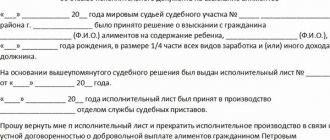Timely receipt of alimony cannot always be guaranteed by a written agreement or a court order. The irresponsibility of the payer, his insufficient financial capabilities or personal circumstances may affect the regularity of payments, resulting in arrears of alimony. This situation arises quite often, therefore, in the legislation of the Russian Federation there are mechanisms to protect the recipient from violation of the law. With the help of the Family Code of Russia, you can both collect alimony debt and impose a serious punishment on the violator.
Evasion of payment under a previously issued court order may have various reasons that affect the resulting debt. The payer's circumstances are taken into account both when calculating arrears of alimony and when assigning regular payments to the father. There are the following reasons that cause delays in transferring funds:
- the debtor himself decided to stop paying alimony. In this case, in addition to the main debt, a fine will be imposed on him or the court will impose another penalty;
- health problems, insufficiently high wages, lack of a permanent source of income and other events that do not depend on the actions of the payer;
- incorrect calculation of the amount of payment from the debtor's salary. Usually this can happen due to incorrect calculations by the accounting department of the enterprise where the payer works;
- the recipient voluntarily refused to receive the funds transfer or did not provide up-to-date information about his location.
To ensure that the child does not have problems with finances, it is necessary to promptly contact the executive authorities, who will formalize and collect arrears of alimony.
Limitation periods
The period of absence of regular payments, after which you can submit an application for debt, is specified in the Family Code of the Russian Federation.
Articles 107 and 113 contain the procedure and specific figures on the basis of which debt collection must be filed with the bailiff. It is worth noting that the ability to formalize debt is not limited by the age of the child. Therefore, even upon reaching adulthood, the recipient of alimony has the right to monthly payments towards the debt. You can receive payment for untransferred amounts of monthly payments both for the period after submitting the application and for the time before drawing up the document. The only limitation is the maximum statute of limitations of the debt - three years before the absence of alimony is formalized. Depending on the circumstances of the payor and many other factors, the statute of limitations for an individual case may vary.
In the Family Code of Russia, debt is divided into two types:
- Issued by the recipient himself or a bailiff after prolonged non-payment.
- Arose during the first execution of a court order for the monthly transfer of financial assistance to the recipient’s account.
Depending on the type of non-payment that occurs, both the amount of collection of alimony debt and the amount of the fine that can be imposed on the debtor by a court decision may change.
Deadlines for paying alimony
From what time does child support begin? As a general rule, the obligation to pay child support is imposed on the separated parent from the moment of divorce . But, in some cases, alimony may also be imposed within a marriage - for example, if the parent does not actually live with the child.
In both cases, the requirement to pay alimony must be supported by a voluntary agreement or an appropriate court decision.
The obligation to pay alimony terminates automatically in the following cases:
- if the child is 18 years old or has acquired legal capacity before this time in accordance with a court decision;
- if the child has been adopted;
- if the recipient or payer of alimony has died;
- if the child has committed an intentional crime against the payer.
You can read about the procedure for divorce if you have children and various situations related to this in this article.
If an agreement was concluded between the parents, then the payment of alimony may be terminated for other reasons specified in the document: for example, it may be a specific period or a certain event, for example, the child receiving an independent income.
In some cases, the amount of alimony may be reduced , but not terminated, for example:
- the payer lost his job, became disabled or retired;
- the amount of child support is too large to actually meet the needs of the child;
- the child began to receive income;
- the parent living with the child has remarried, but the child has not been adopted.
Thus, the payment of alimony begins from the moment the court order comes into force or the agreement begins, and ends in accordance with the law or in connection with the occurrence of circumstances taken into account in the agreement.
Step-by-step process for receiving debt payments
You can submit an application for debt from the alimony payer if one of the following types of documents was previously issued:
- writ of execution received from the bailiff;
- a drawn up and notarized agreement between the parties;
- by order of the judge who was considering the case of recovery of financial resources from the father of minor children, who is not their guardian.
An application for alimony debt is drawn up and submitted to the bailiff, who, on the basis of the Russian Constitution, will draw up a resolution to open proceedings. Both the debtor and the recipient must receive notice of these actions. To simplify the investigation process and quickly resolve the problem, the payer is invited to begin paying the debt without trial.
Depending on the material well-being and type of source of income of the debtor, the procedure for the bailiff’s action also changes. If there is official employment, deductions from wages are carried out by the enterprise’s accounting department. In the event of a long absence of transfer of funds, debt collection is carried out through an accountant, and the debtor is sent only a notification about the existence of the debt.
If a person has his own business and does not transfer the funds established by the state to the account of the child’s guardian, there are two options for how to collect child support arrears:
- Application of state legislation for the collection of alimony is mandatory. For this purpose, measures available to the bailiff are used to influence the payer. In case of further refusal of the person to voluntarily cooperate with the state representative, the subsequent solution to the problem will be carried out through the court.
- If the debtor contacted the bailiff in time and came to a joint agreement with the recipient, he can independently agree on a regular transfer of funds in a form convenient for both parties.
Depending on the debtor’s wealth, it is determined how to collect the alimony debt and the amount of the monthly payment towards the debt is calculated. In the absence of accurate data on the amount of income, the cost of living is used and the ratio of the amount of the regular transfer to this indicator is determined. If there is a document on the payer’s income, the amount specified by the legislation of the Russian Federation is deducted from him. Also, in the absence of a permanent source of income, the average salary in Russia can be used.
Find out IL number by last name
The amount of information that can be extracted from publicly available databases is substantial. Federal Law No. 229 regulates aspects of production, and the citizen involved in it can view comprehensive information, knowing one of the details. Due to the fact that the databases are interconnected, and the court decision, which is the basis for issuing the IL, contains information about the parties. After transferring the sheet to the bailiffs, the movement of the document is reflected in the database of this service, making it possible to establish the performer, the stage of production, the motives for performing certain actions by the bailiff and the amount of satisfied claims.
The number of the writ of execution can also be found on the writ itself.
The main source of information is the FSSP website: fssprus.ru; for convenience, you can use the website of the regional department of the service. The address will be distinguished by a prefix corresponding to the region code. For example, for the Tyumen region the official website of the FSSP management will be: https://r72.fssprus.ru/, and for Vladivostok https://r25.fssprus.ru/
Methods of influencing the debtor
If requests and warnings from government officials are directed at a person who, for a certain period of time, has not transferred the amount established by a court order or agreement, as a result of which a child support debt has arisen, then more stringent enforcement measures may be applied. These include the following:
- Collection of property rights. In this case, the property of the violator is seized, and in the future it may be sold at auction. Funds received for the sold property will be transferred to the recipient's account.
- In accordance with Article 67 of the Law “On Enforcement Proceedings”, the violator may be issued a ban or restriction on traveling outside the borders of Russia. Upon completion of the proceedings and enforcement of the court decision, the temporary restrictions on the person are lifted.
The payer is called to court proceedings due to arrears of alimony if there is a prolonged evasion of payment of child support. After the investigation, a decision is made on further action on the offender. In case of seizure of real estate or its alienation in favor of a child, the court order is transferred to the bailiff, who performs all subsequent actions. If during enforcement proceedings the alimony debt has not been paid and is not being repaid, government officials will carry out the procedure for alienation of property.
In addition to repaying the alimony debt and collecting property, the violator may be assessed a penalty. The fine is 0.5% of the total debt amount. The penalty is added to the total amount of debt daily. The payer can stop accruing penalties by starting to regularly pay the debt in the amount established by the state authorities.
The father does not pay child support and the bailiffs cannot collect it - what should you do?
In Russia, 65% of families break up. These are the statistics. If you are left with a minor child, but do not receive financial assistance from his father, we will tell you where to go.
The main condition for successful collection of alimony payments is impeccable legal literacy. Any violation of the law will be used by the debtor to his advantage. In other words, you need to rely solely on existing bills. And the main one (RF IC) obliges parents to take care of their minor children, including financially. However, fathers who left their family are trying with all their might to evade responsibility - they get jobs with unofficial salaries or are even listed as unemployed. One option is to collect fixed alimony payments. Your task is to prepare receipts from stores, housing departments, schools, sections, i.e. document your expenses for the child. In 97% of cases, the court decision will be made in favor of the alimony recipient. Typically, your ex-spouse will be responsible for paying 50% of the expenses you incur.
The next option is that the debtor is officially employed. In this case, the bailiffs send a writ of execution to his work to collect alimony. But there are often cases when a formidable paper with an order to repay the debt is lost in the depths of the accounting department, secretariat, or ignored by the employer. In such a situation, request an inspection of the organization (accounting) by the bailiffs regarding the transfer of alimony. To do this, you need to make a corresponding request (by registered mail) to the FSSP office located in the area where your ex-spouse works.
All these measures apply when the whereabouts of the ex-spouse are known. A more complicated option is that the father does not pay child support, and the bailiffs cannot collect it, because... they don't know where he is. Of course, they will take the necessary actions to find it (and more often they will imitate its visibility), but without your participation the result will be zero. Therefore, we recommend that you familiarize yourself with the options for searching for a debtor yourself.
So, the child's father disappeared in an unknown direction. In this case, the bailiff conducting the proceedings puts him on the wanted list - the corresponding paper is sent to law enforcement agencies. In addition, the law does not prohibit conducting independent searches. To do this, you need to contact the FSSP again and get a certificate from them with a debt calculation (calculated based on the average salary in the region). Moreover, you can look not for the alimony provider himself, but for the property that belongs to him. You can find it in several ways:
- You have information that the debtor has opened an individual entrepreneur or LLC. Their address or details can be found at the tax office.
- The defaulter owns real estate (garage, dacha, land, etc.). You can clarify this data by contacting the registration or cadastral chamber.
- According to your information, the ex-husband owns a car. You can check the details at the traffic police department.
In addition, mutual friends, acquaintances, and relatives can tell you where your ex-husband is “lost.” If one of the options makes it possible to establish the location of the defaulter or his property, the first thing to do is notify the FSSP. After all, you cannot take away the debtor’s belongings, his real estate, or transport without involving officials. Having found the alimony provider’s property, make a claim that you are claiming it in whole or in part. And at the same time declare that the property and the car should be seized. Otherwise, the debtor may sell all the property and disappear again.
Searching for a debtor often takes a long time. For this period, you can apply for an increased benefit at the territorial social protection office. To do this, a statement is written to the head of the unit with a request to assign an increased allowance until the debtor is found. The request must be confirmed with a certificate stating that the search carried out by the police did not produce results. In the future, the expenses incurred by the state are reimbursed by the ex-husband.
By the way, when neither the police nor the bailiffs can find the debtor, this is grounds for declaring him missing.
To do this, you need to go to court with the same certificate of unsuccessful search. If the request is granted, apply for a pension for the loss of one breadwinner.
According to current legislation, only bailiffs are involved in collecting alimony payments. But there is a nuance - if the claimant himself is not interested in the progress of the case, then they will not work at full capacity. There are often cases when, if the recipient fails to act, officials also fail to act. Therefore, if you have doubts about the competence of an FSSP employee, you can send a protest to higher authorities: the senior bailiff, the bailiff inquiry service and even the prosecutor’s office.
It is better to write complaints to all three authorities at once. We recommend sending registered letters - notifications in which the recipient signs, allows you to record the fact of delivery of the document.
FSSP employees are given 30 days to fulfill your demands. If they continue to fail to act, write a complaint to their immediate superiors, and send a copy to a higher authority. By the way, in addition to the alimony itself, you are paid interest for non-payment and are compensated for the money spent on a lawyer (if you contacted one). The penalty is calculated daily in the amount of 0.5% of the total debt - Art. 115 RF IC.
As you can see, forcibly receiving alimony payments even under a writ of execution is not an easy task. The best option remains the voluntary payment of child support by the second parent. The concluded agreement will save time - you won’t have to go to the courts and collect documents and money, you won’t need the services of lawyers, and this will save your nerve cells.
The bailiff service is required to tell the debtor what the consequences of failure to pay alimony will be, at least twice. But, perhaps, going to court and the FSSP can be avoided if you are convincing and are able to explain to your ex-spouse that if he refuses to pay alimony, he faces:
- ban on traveling outside the country;
- deprivation of the right to drive a car;
- imposing a fine of 100 minimum wages (if the bailiffs discover concealment of income).
These are administrative measures. However, when the debtor does not pay alimony for more than four months, more serious sanctions may be applied - criminal liability. In addition to long-term non-payment of salary, the basis for the attack may be concealment of income and evasion of meetings with bailiffs.
Depending on the circumstances of the ex-spouse’s case, in accordance with Art. 157 of the Criminal Code of the Russian Federation, they can punish:
- Forced labor for up to 12 months.
- Community service (terms from 20 to 180 hours).
- Imprisonment (arrest) for up to three months.
- Serving a sentence in a correctional institution for a period of 1 to 3 years.
In addition, such a parent can (and sometimes needs to) be deprived of parental rights. But this measure is educational in nature and rarely forces the child support provider to pay the money due to his child. As practice shows, the most effective measure of influence remains the threat of criminal punishment.
Procedure for the recipient of alimony
In order to collect alimony debt as soon as possible, you need to familiarize yourself with the Family Code of the Russian Federation and seek help from a bailiff. A properly prepared evidence base containing all the information about payments made and not transferred by the child’s father will significantly speed up the process. You also need to have a document indicating the monthly amount of transfers.
Depending on what circumstances contributed to the emergence of the debt, the procedure for the recipient of alimony changes. If the reason for the debt is a long process of enforcement proceedings, you need to apply for debt collection to a bailiff. The same is true in the case of incomplete or untimely transfer of funds. After filing an application for debt collection, various methods of forced collection of funds against the debt may be applied to the violator.
If the result of the bailiff’s work remains unsatisfactory or alimony has not been paid and is not transferred, a person who has the right to financial assistance in maintaining a child can petition the magistrate’s court. Also, in the application for opening proceedings, you can indicate the requirements for measures to ensure guarantees of the fulfillment of obligations by the father of the children. This will help speed up the process of paying both arrears of alimony and penalties for violations. At the end of the proceedings, the plaintiff receives a writ of execution, which can affect both the defendant’s income and his material property.
Child support for a second child in 2021
Contents: 1. Calculation of the amount 2. Voluntary settlement 3. Judicial option 4. Change in the amount of payments 5.
I applied for alimony several years ago, throughout the entire time I paid 1000 rubles every month. Documents were provided that it does not work officially. Can I demand an increase in the amount of alimony or force me to do forced labor? What kind of application do I need to write?
No you can not. You can apply to the court to collect the debt that has accumulated.
My husband hasn’t paid child support for 4 years, which court should I file with?
To the magistrate's court at the place of residence or registration of the child's father.
My husband doesn’t pay alimony, which court should I go to? Lives on Glushko, registered in the Arsky district?
Have you received a writ of execution for collection? If not, then you must first file a claim with the magistrates’ court to establish alimony. Then receive a writ of execution, take it to the bailiffs, they will begin enforcement proceedings.
I applied for the elements and was awarded 5426 rubles. Doesn’t work for 4 months and doesn’t make contact! He says the bailiffs will give him a hard time! Can I submit a larger amount to pay more?
You can apply for an increase in size, but it is unlikely that your requirements will be satisfied if a decision has already been made on this issue. Did you apply to set the amount in a flat monetary amount or as a percentage of income?
Hello! My ex-husband has not paid alimony for more than a year. He went to live in another region. The bailiffs say that they do not calculate penalties. Where can I go in this case? How can I force him to pay?
You must calculate the penalties yourself when you write a statement of claim for debt collection. You cannot force a person to pay, you can only submit writs of execution to the bailiffs so that they collect the debt from his bank accounts. Bailiffs also have the right to sell the debtor’s property and transfer the money from the sale to you. You can also file a claim for deprivation of parental rights if the father is a persistent defaulter.
11 years ago I divorced my husband. I filed for alimony. I took IL to the bailiffs, and for 5 years they didn’t transfer a penny. Then I received a notification that my ex-husband had a child support debt of 280 thousand rubles. At that moment, my husband and I made peace, I felt sorry for him, I thought we would live. I refused the money in writing. A couple of years later we separated again. He paid alimony every six months, 2 thousand, i.e. for the year 4 thousand in total. Can I claim debts for all years?
Try to draw up a statement of claim in court, attach evidence and documents that you have. Everything will depend on what decision the judge makes
Take the writ of execution to the bailiffs or to the accounting department at your place of work so that they can deal with collection issues.
My ex-husband has been avoiding paying alimony for 2.5 years. The bailiffs don't do anything. To my question about opening a criminal case against him, they answer that they cannot open one since he has never appeared before them. What can I do in this situation?
Write a complaint against the bailiffs to management and the prosecutor's office. You also write a request to the prosecutor’s office so that they assist in initiating a criminal case.
The writ of execution is with the bailiffs. I applied for alimony on November 10, 2014, the first transfers were on January 15, 2021. I called the bailiffs, the answer was that these were all the funds that were available. There is no more money coming from him. I want to submit a review of the writ of execution to establish a fixed amount. Is this realistic in my situation?
I can’t tell you because I haven’t seen your documents. If the child’s father receives an official salary, then it is almost impossible. Go to the bailiffs, find out what they did, where they got this money from. If it’s from your salary, then why are there no more write-offs? If you know where the child’s father works, then you can pick up the writ of execution from the bailiffs and take it to the accounting department at your place of work so that child support will be transferred to you automatically.
I applied for alimony, at first I paid 6500)) then I bought a certificate that it works, and the salary is 6000 thousand, they started paying me 1500 but not monthly)) I don’t have enough of this, what should I do?
Oksana, try to discuss this situation with the bailiffs first. Perhaps they can find his real job and income. You can threaten to contact the prosecutor's office and initiate a criminal case for forgery of documents.
Leave a comment X
About our site
The information on the site is provided for informational purposes only. Please consult with an attorney before making any decisions. The site management is not responsible for the use of information posted on the site.
Debt collection after the child reaches adulthood
According to Russian legislation, both arrears of alimony and penalties for failure to fulfill their obligations can be withdrawn from the debtor even after the child reaches the age of majority. At the same time, the child support payments themselves, previously established by the state, cease. This is stipulated in Article 120 of the Family Code of the Russian Federation. Debt collection will continue until the debt is paid in full or until a new court decision is received. If in the future the debtor evades his duties and does not cooperate with government representatives, a criminal case may be brought against him, which will lead to a more serious punishment for the violator than the accrual of penalties for late payments of funds.
Collection of alimony for the past period - legal realities
The obligation of parents to support their children until they reach adulthood is enshrined in the Family Code, and it remains regardless of where and with whom the children live. For parents living separately, this obligation is expressed in the form of alimony. But after a divorce, many parents “forget” to transfer the money they are entitled to into their children’s accounts, and they have to force them to get it.
Dear readers! Our articles talk about typical ways to resolve legal issues, but each case is unique.
If you want to find out how to solve your particular problem, please contact the online consultant form on the right or call the numbers below. It's fast and free!










